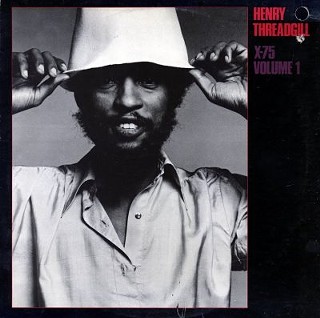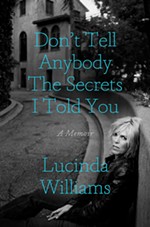Q&A: Henry Threadgill
Master improviser speaks on sustaining creativity
By Kevin Curtin, 9:00AM, Thu. Apr. 6, 2017
Henry Threadgill makes an ultra-rare Austin appearance this weekend. The Chicago-born, New York City-stationed composer, flutist, and sax player appears at UT’s Music Recital Hall on Friday for a workshop and Q&A, then performs with his ensemble Zooid, Saturday at the Scottish Rite Theater.
Via a Monday morning phone call, the recent Pulitzer Prize of Music winner spoke extensively of the life of an artist and creative longevity.
Austin Chronicle: Do you recall the last time you played in Austin? I do believe it’s been a minute.
Henry Threadgill: I don’t know what year it was. I know what group I was with. It was with Very Very Circus, so it must have been the early Nineties. I think we were touring at that time – doing an American tour. I haven’t played in Texas enough. My Sextett played in that city across from Dallas, Fort Worth, in the late Eighties, I think. Then I think I played in Houston once. There’s been a huge gap since I last played in Texas.
AC: How much do you tour these days, considering you’re a man in your mid-70s?
HT: I don’t really tour anymore. I just do single engagements now. I don’t really need to tour for a whole lot of reasons: It’s too much work, it’s too much physically, travel is not nice. You know, traveling used to be fun. People used to go to the airport with you or wait for you there. Not anymore. Nobody even wants to go the airport. The truth is, it’s harassment. It’s all this false sense of security and this false sense of insecurity.
So touring is a big, complicated thing and we never really did tour a whole lot in the United States anyway. Those were rare. That would have been probably back when people were going on trains. In Europe you could do one-nighters. So, like I said, I just do single engagements. That’s all I can really do because it takes too much to put into it and it’s a losing proposition. I don’t have that kind of money to throw away.
AC: You’ve had some very interesting ensembles over your career. How hot are you on your current band Zooid?
HT: I’ve never had a band this long. It’s been 14 or 15 years and that speaks for itself. To keep a group that long without changing means it’s a fantastic group of artists. There’s been one, maybe two personnel changes, but basically it’s the same concept and 90 percent of the original people. It’s very hard to come by that and it happens very rarely. You can stay in relationships for a long time, but they usually stop yielding creativity and being inventive.
It’s not my musical persuasion to stay in a situation just because it’s comfortable. They have to be yielding something. When the musicians stop yielding, it’s time for me to let ’em go. It’s a mistake to try to keep things together. If they’re gonna come apart, it’s gonna come apart, and the sooner the better, so you can get on to something that’s really gonna stick.
Bands have a “shelf life.” It could stay for a week, a month, a year, 15 years, whatever. That’s what it’s gonna be and it’s better not to force or impose something.
AC: Obviously your own ability to stay fresh is well proven, but so often artists get stuck in their lane. What do you recommend for them to keep progressing and continue innovating for decades?
HT: You have to have an open position about the arts. If people are stuck in one lane, it’s because, most of the time, they’re just looking at one thing. You have to look at all of the art and music, and learn from all of it. The thing that’s going to inform you is having a broad picture, not a narrow picture. A broad picture will cause you to have to study.
You can never stop studying. In my opinion, to stop studying is to stop, period. It means you have nothing else to learn. So you basically hit an impasse or there’s a limit to how much information you have, and you go express what that information is, but you can’t go beyond it.
So it’s all about continually staying in a growth frame of mind, studying frame of mind, and a completely wide open frame of mind. Ruling nothing out, as the detectives in the movies say.
AC: What do you think of the state of jazz today? Do you still consider yourself part of that ilk?
HT: I really don’t know what the state of it is. All I know is what happens in the small world that I live in. I’m around a nice amount of very creative and good, young musicians that I think are very broad and open, so I’m hopeful. I see where they’re trying to go musically, but other than that I can’t even really comment, because it’s all changed so drastically and I don’t even know if I’m a part of it anymore. I just keep creating.
The world of music is in turmoil in terms of the life of the musician. You’re calling me in New York City. This is supposed to be the cultural capital of the world … for now. The cultural capital has always moved around. It’s been in Vienna, Paris, many places at different times. Right now we seem to be enjoying that, but it’s basically become totally economically unfriendly to artists.
The New York Times has cut down reviewing and looking at the arts. If they’re not covering the live performance and premieres, it’s useless. If we have something the equivalent of Beethoven’s Fifth Symphony, is anyone gonna be covering it? We can’t have Romeo and Juliet premiering in a cheap hall because no one was in the forest when the tree fell. If Charlie Parker came out now and played what he played, would anyone be documenting it?
Then the city isn’t taking responsibility of being the cultural capital. It’s not possible for young artists to come here and live. So I don’t see that this is going to be the cultural capital for long because it’s too expensive. You can’t be too expensive for people who want to make films and write poetry and be choreographers, etc. That’s what, historically, makes a place a cultural capital and then it draws other people to it because it becomes a scene. That’s not happening anymore, so this is a whole new time for music.
The presenters don’t want to pay for young musicians, so they’re taking it back to square one and making them play for the door. American people have lost their learning in terms of ethics and morality. They’ll put your music up so people can download your album as soon as it comes out as if artists don’t need to make a living. You can’t tell me people who do this don’t have $10 or $15 for a CD. That’s a big lie. Taking music for free is a very bad habit now.
AC: I listened to your X-75 Volume 1 on Spotify last night. That probably makes me part of the problem.
HT: I don’t get anything, maybe a few pennies. These people are basically shysters, hustlers, pimps, pickpockets, and thieves! They’re existing off of other people’s work. I never gave them permission to stream my music. They don’t have any agreement with me. This is what the government has allowed.
Now you just go into business. You don’t even need to register it. You just put up your name, sell people’s junk, take people’s money, and disappear because you don’t have an address and people don’t know where to find you.
Technology has its upsides and downsides, and the government and cities haven’t been responsible for the downsides. The downside allows for criminal activity and the disrespect of artists.
AC: So where does that leave the artist?
HT: Broke [lets out a bellowing laugh]. That’s where it leaves them! The future is bleak for artists.
AC: You’re known for both composition and improvisation, which seems counterintuitive. When you’re onstage, how deep is your commitment to each?
HT: My commitment to improvisation is always the same, 100 percent. I don’t know what’s gonna take place. That’s the thing about improvisation, you enter the unknown and engage it. You prepare for it, of course, but you don’t know what the outcome is going to be. My music is notated and improvised, and there’s always a balance going on between those two. We change the notation percentages with each rehearsal in preparation for a concert. The notational element is always changing with how much of it we use.
AC: You’re now getting recognition from high-profile places. You received the Pulitzer Prize in Music for In for a Penny, in for a Pound, you’ve played at the Library of Congress. Is that a type of recognition you have sought as an artist?
HT: I don’t ask for that type of recognition, but it’s confirmation that what I’ve been doing means something to somebody. I play for humanity, so any part of humanity that appreciates it is valued on my end.
Purchase tickets to Friday's workshop and Saturday's concert, presented by Liminal Sound and Epistrophy Arts, here.
A note to readers: Bold and uncensored, The Austin Chronicle has been Austin’s independent news source for over 40 years, expressing the community’s political and environmental concerns and supporting its active cultural scene. Now more than ever, we need your support to continue supplying Austin with independent, free press. If real news is important to you, please consider making a donation of $5, $10 or whatever you can afford, to help keep our journalism on stands.
Rachel Rascoe, June 30, 2023
May 10, 2024
May 3, 2024
Henry Threadgill, Pulitzer Prize, Beethoven, Charlie Parker, Very Very Circus, Zooid










